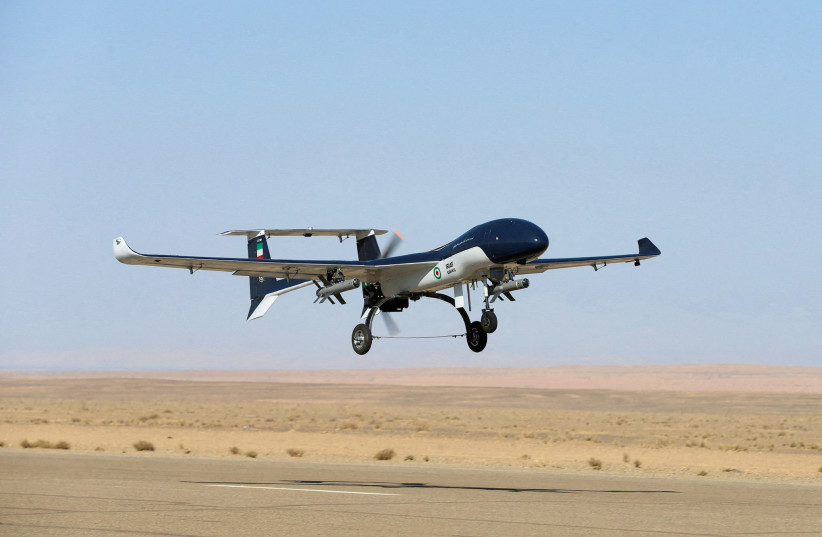US Lt.-Gen. Alexus Grynkewich on Wednesday suggested a deliberate American response in a simulation where Iranian proxies would hit a mix of Haifa, Eilat and the US Tanf base in Syria with drones in response to an Israeli attack on Iranian nuclear and military sites.
Grynkewich was speaking at a conference sponsored by the Institute for National Security Studies (INSS) with the simulation involving drone attacks from Iran’s proxies in Lebanon, Yemen and Iraq.
Although merely a simulation, it was significant that Grynkewich strongly emphasized a slow response with a focus on avoiding escalation as opposed to facilitating Israel or the US responding militarily to reestablish deterrence with the Islamic Republic.
Such a response would likely contrast significantly with a likely more aggressive military approach by Israel to deter Iran from such future drone attacks.
Tehran has sought to attack the Jewish state many times using drones, either from Iran or from proxy states, but all of them have been shot down.

Significant trauma for Jerusalem
This would make the simulation a significant trauma for Jerusalem. In contrast, Iranian responses to alleged Israeli attacks on Tehran’s nuclear and military facilities have so far been limited to Israeli or Jewish assets and interests overseas, but not against Israel-proper.
“We would be reminded of our ironclad commitment to the defense of Israel;” Grynkewich said. “We would be thinking through the best way to fulfill that commitment. From a military perspective, we would be offering our recommendations about ways to provide defense for Israel to manage any potential escalation of the situation.”
“We would be reminded of our ironclad commitment to the defense of Israel. We would be thinking through the best way to fulfill that commitment."
Alexus Grynkewich
HIS INITIAL recommendation would be “to try to really figure out what happened. There is a fair amount of ambiguity about who is responsible. The attack came from groups who are proxies to Iran. To what extent did these partner groups do this on their own or with Iranian guidance and support? We would look at what the Russian response was as well,” Grynkewich said.
“We would pause and let the intelligence team do some of their work to develop the scenario a bit more before jumping into any kind of military action.”
Pressed about whether the US would take military action, he said that it depends. “There would be a lot of discussion about this, bilaterally between the US and Israel, and with a number of other countries equally concerned. Some would be countries in the Abraham Accords.
“Other regional players are equally concerned about Iran. I am thinking back to 2019 when there was a very similar attack on the Kingdom of Saudi Arabia. There would be competing asks to the US and we would need to balance” other US commitments around the world with deploying any new US forces in the Middle East.
Grynkewich added that he would try to facilitate a de-escalation, to increase future air defense cooperation between Israel and the Abraham Accords countries, and to “worry about deterring attacks on US forces” and avoid a situation where countries would view America as “complicit” for any military actions by Jerusalem.
LATER AT the conference, former IDF intelligence chief Tamir Hayman contradicted CIA Director William Burns regarding the handling and seriousness of the potential Iranian nuclear threat.
Hayman, INSS’s managing director, was asked about Burns’ statement that since Iran’s Supreme Leader Ayatollah Ali Khamenei has not given a formal order to go for a nuclear weapon, the nuclear threat was still far off.
In contrast, the former IDF intelligence chief said he disagreed with the idea that “if you don’t identify an order from the top, [it] is a sign that there is no [nuclear weapons] plan. Even if there is no formal paperwork, things continue.”
Rather, Hayman said that Burns’ statement showed a common Western misunderstanding of the Iranian mentality which does not always move in a linear fashion to achieve its goals, but might take an apparently much more zigzagging and roundabout path.
“This is a much more Eastern strategy. We can’t just go based on [a scenario that first] we see an order from Iran’s supreme leader [and] only then will we see a nuclear [weapon],” he said.
The Islamic Republic has “continued the nuclear program to [bring it] to unprecedented highs,” Hayman said. “This is not just about uranium enrichment – on this issue, they are almost ready – but also regarding weaponization issues. This will go from the bottom to the top: to the supreme leader.”
Further, he said he could even envision an IDF intelligence investigation in the future after missing the fact that Iran had broken out to a nuclear weapon because they had been focused on looking for a formal order from Khamenei.
IDF intelligence officials would try to defend their failure by saying: “but we didn’t see a formal plan or order,” Hayman said. “But these things can happen from the bottom up. We need to be very careful not to disregard” the nuclear weapons threat just because there is no order.
At the same time, Hayman said Israel could be temporarily calm for now since “uranium enrichment is not the same as a bomb… but we do need to watch the level of motivation from the bottom” – from Iranian nuclear scientists and military officials.
In addition, the INSS managing director dismissed the focus on a recent announcement that Iran had enriched uranium up to 84%, the closest ever to 90% weaponization levels.
Though important, he said the focus should be more broadly whether Iran is actually going for a nuclear weapon, because once it had even crossed the 20%, let alone 60% enrichment levels, it was already very close to uranium enrichment weaponization.
